
Beatings, injuries, detentions. Searches, arrests, court hearings, prisons. Website blocks, refusal to print and distribute, revocation of credentials… Belarusian independent journalists and media are not protected by the law or Press vests or press cards.
Since August 2020, journalists, editors, photo correspondents have worked without proper rest, under constant stress and uncertainty. Nobody knows who will be the next for the security officers to come to, who will be the next to be detained. Yet despite all that Belarusian media carry on their work: they find and distribute information about what’s happening in the country here and now.
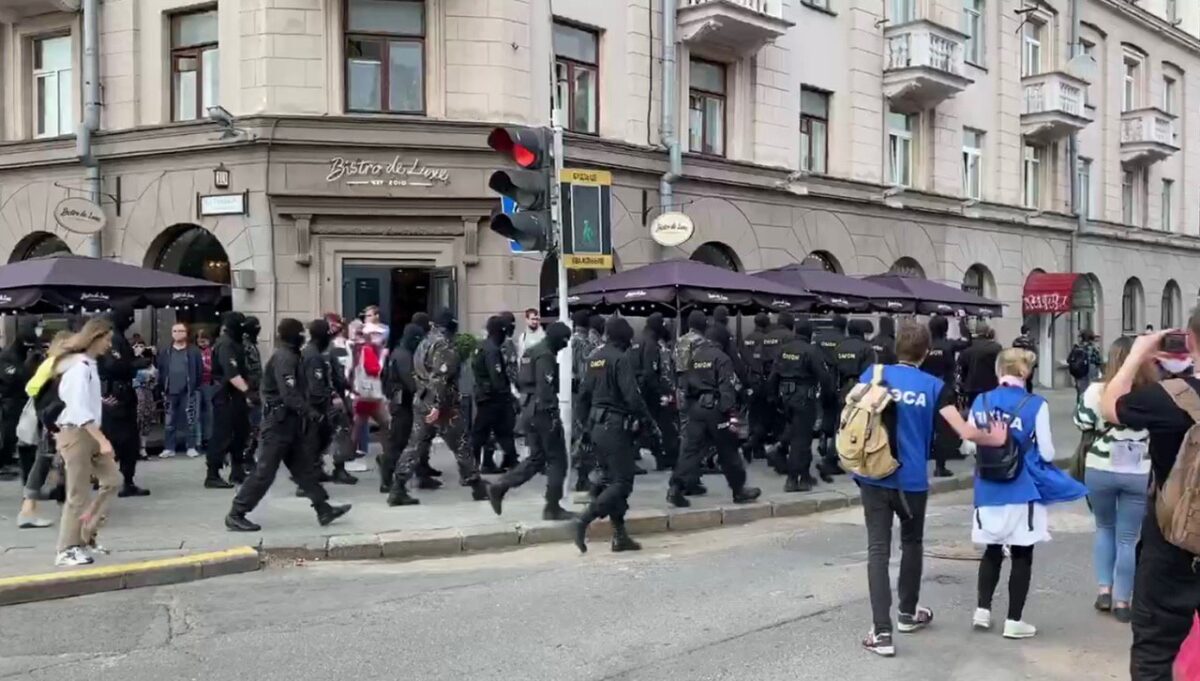
Journalists during a rally, following which they were convicted for coordinating the protest march. Photo by TUT.BY
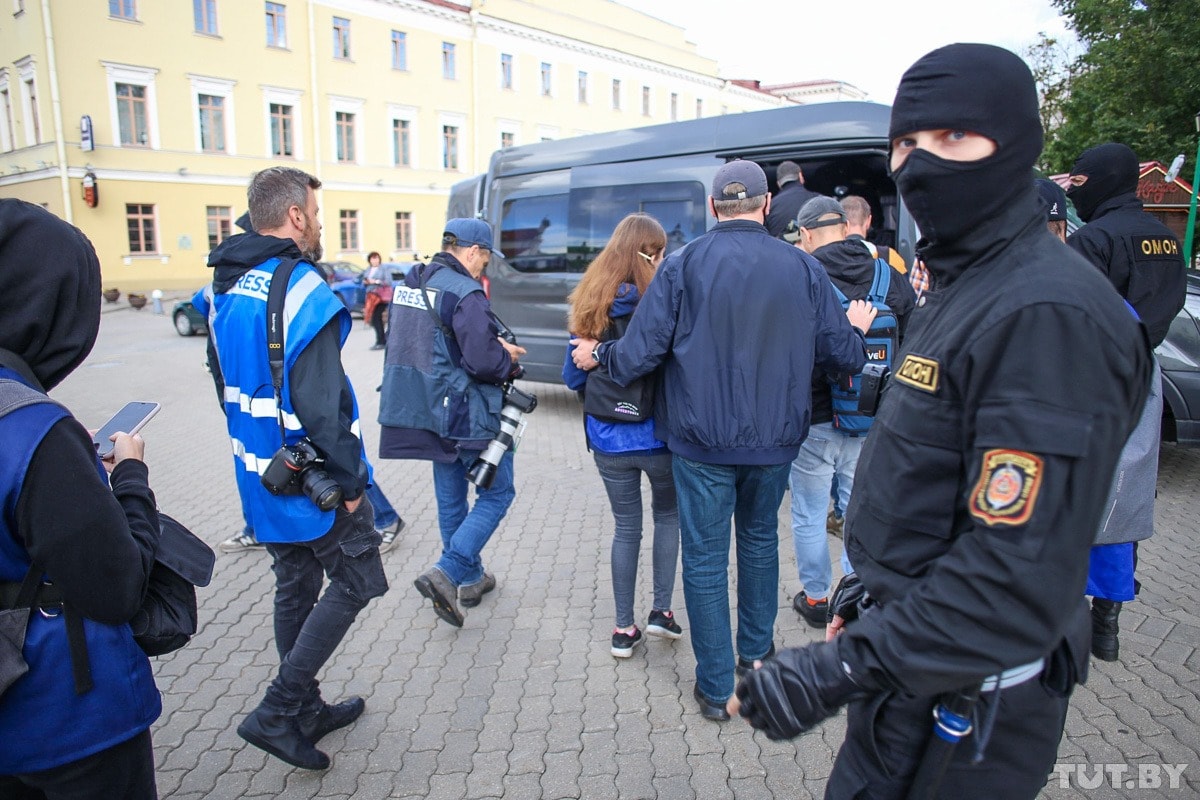
A group of journalists being detained before a rally starts to prevent coverage of events.
The Press Under Pressure project was created by the Press Club Belarus team in the fall 2020 and still can’t be deemed completed. The number of affected journalists keeps growing, stories added and continued.
Journalists are being detained and imprisoned for the second, the third time… Many were forced to flee Belarus due to security threats. The country’s largest information portal TUT.BY was destroyed, 15 of its officers—including Director General and editor-in-chief—are kept at pre-trial detention facilities or under house arrest. The Press Club got under pressure too: the organisation’s founder Yuliya Slutskaya, financial director Sergey Olshevski, programme director Alla Sharko and camera man Peter Slutsky have been imprisoned at the pre-trial detention center since 22 December 2020.
Journalists are detained while working on the streets, ostensibly for document checks, but are then taken to police departments, cutting them off from events and denying them the chance to report from the ground. Correspondents and photographers are often detained both during livestreams and before events begin, being physically removed from the streets.
Such detentions can be especially widespread on some days, either on the eve or at the beginning of protests. During just one day, August 27, the security forces removed 47 journalists from the streets of the cities of Minsk and Brest.
Then security officers turned on independent media editorial offices and the journalists’ and media managers’ homes with sudden searches. In most cases these searches ended with detainment: people were taken to detention centers and then, possibly, to pre-trial detention facilities.
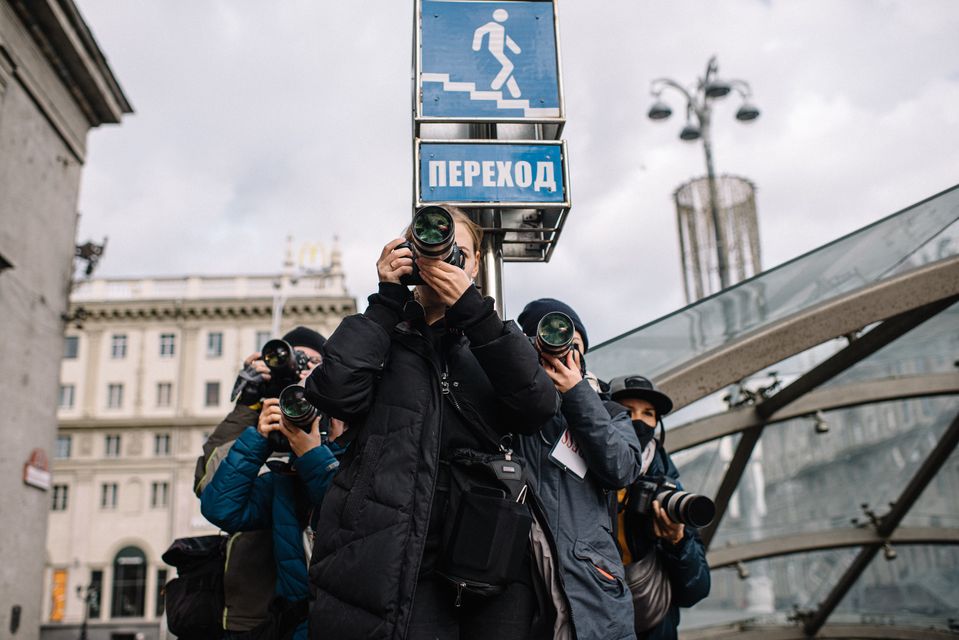
Security officials warn photo journalists that they must not approach the crowd more closely. Photo by Pavel Krichko
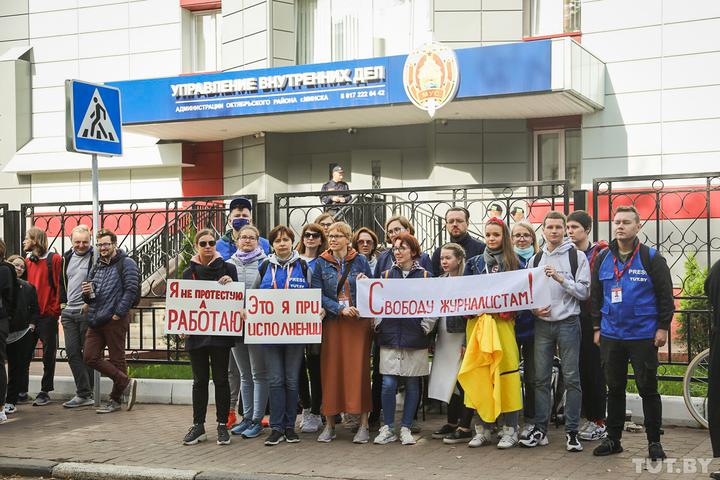
Journalists gather in front of a police station in solidarity with their detained colleague holding posters «I DO NOT PROTEST, I WORK», «THIS IS MY DUTY», «FREEDOM TO JOURNALISTS». Photo by TUT.BY
In August–October 2020, journalists were sentenced under the Administrative Code articles: first under article 23.34 «for participation in a rally», then article 23.4 «for disobeying an officer» was added which allowed the judges to rule longer terms of sentence, up to 30 days.
Conveyor court hearings producing identical sentences, witnesses in balaclavas under assumed names. Judges never let lawyers defend their clients, interrogate anonymous witnesses or establish their identities.
Since November 2020, journalists have been involved in criminal cases. 6 journalists have been accused under Article 342, part 1, of the Criminal Code «Violation of the procedure for organising or holding mass events». Another 2 journalists have been suspects in other criminal cases, such as «disclosure of medical secrecy with grave consequences» after a resonance publication or alleged libel against a high official.
On 22 December, Press Club Belarus got under the «criminal pressure» as well. And since January 2021, the number of criminal cases against journalists started growing exponentially. Journalists have been accused of «financing protest activities», «tax evasion», «insulting the President of the Republic of Belarus»…
On 18 February 2021, the first court judgement was made under one of such criminal cases: Belsat journalists Katerina Andreeva and Daria Chultsova were found guilty and sentenced to two years in a low security prison.
On 19 February, the court started hearing the case of TUT.BY journalist Katerina Borisevich. On 2 March she was sentenced to 6 months in a low security prison and a fine of 100 base units.
The next victim of the regime was Sergei Gordievich, journalist of The First Region publication. He was accused of affront and libel against the President and of affronting police officers in a chat which had already been deleted. The journalist was first subjected to house arrest and an undertaking not to leave. However, on 2 August, the court ruled a new sentence, imprisonment for one and a half years.
Despite the fact that journalists do not participate in rallies and wear special vests in order to remain visible at all times, they are still among those brutally beaten and detained. In the early days of the protests, the security forces beat and tortured detained journalists.
On August 10, Nasha Niva journalist Natalia Lubnevskaya was shot in the leg with a rubber bullet while working at a protest in Minsk. Nasha Niva published a video where you can see the security forces officer fire at Natalia from close range.
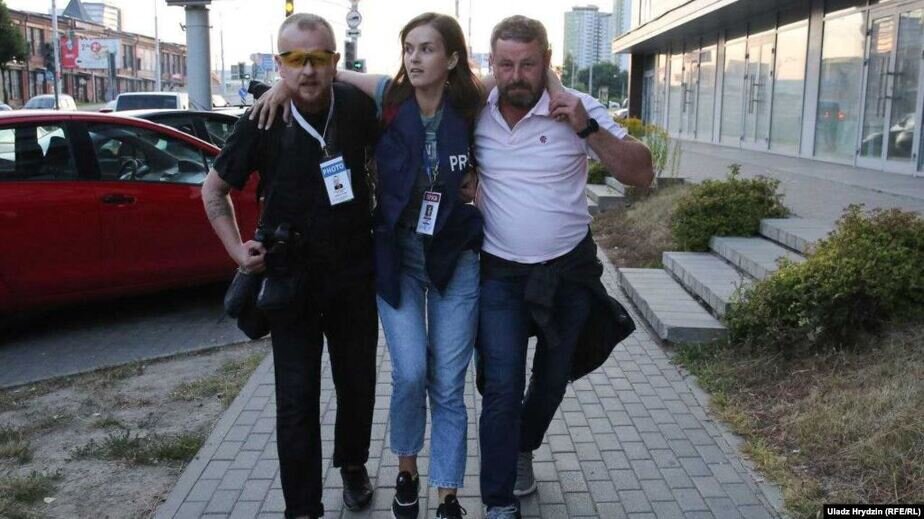
A journalist injured by a baton round led by her colleagues. Photo by Uladz Hrydzin
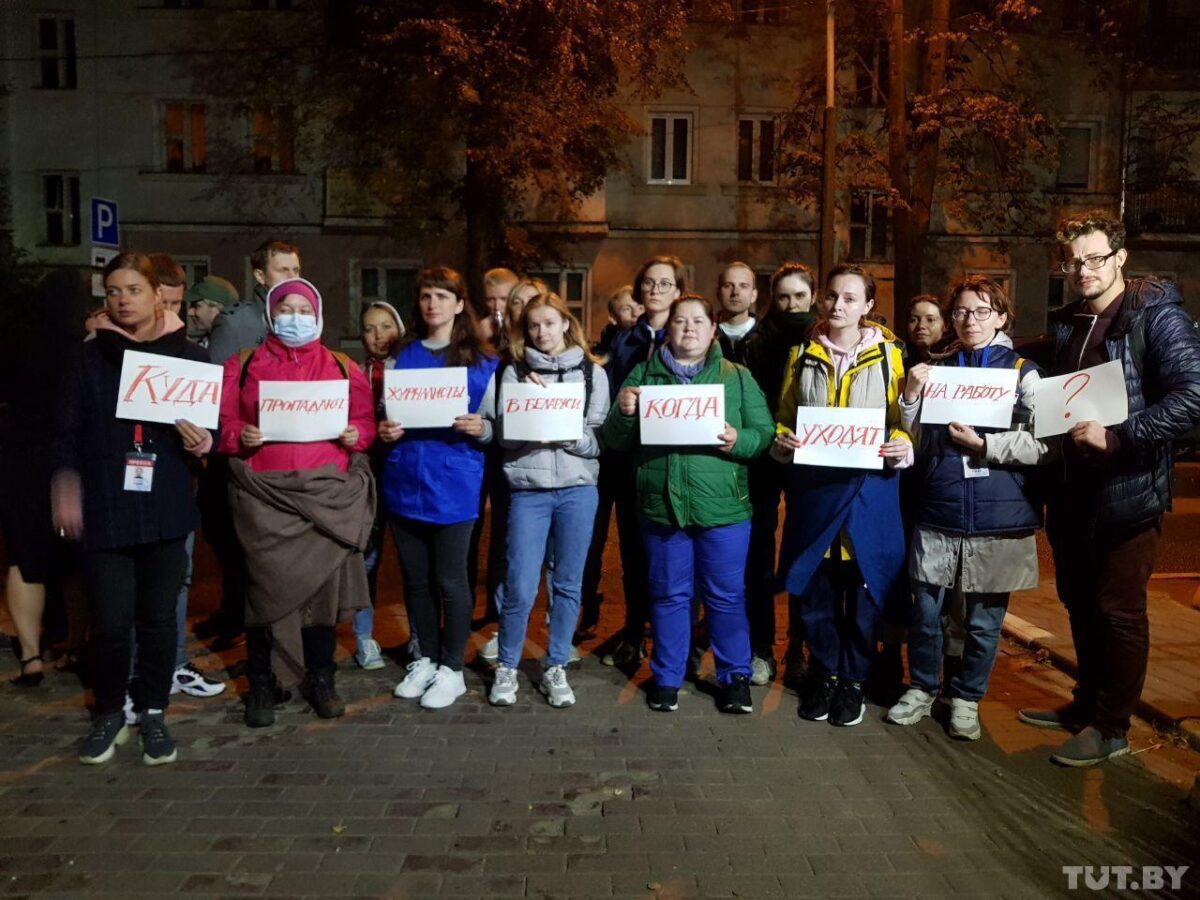
Journalists stage an all-night vigil in front of a police station where their colleagues are being held. Minsk residents brought warm beverages and food. Photo by TUT.BY
Belarusian legislation provides for a specific form of sanction against the media – written warnings issued by the Ministry of Information. A media organization can be closed by a court decision if it receives two or more warnings within a year.
TUT.BY received four warnings during August and September 2020. The Ministry of Information filed a lawsuit to close down the online platform TUT.BY. Its status as media were suspended for three months, from October 1 to December 30, 2020.
The economic court’s decision of December 3, 2020, stripped TUT.BY of its media status, however, this does not mean that the portal will cease to operate. TUT.BY continues as an «Internet resource» and, according to the Law «On Media» (Article 301), an Internet resource can collect and distribute information.
The media status gives certain benefits, such as the right to be present in the zones of armed conflicts or emergency situations, at public events, in places where socially important events are held, and disseminate information from there.
This, however, didn’t stop the repressions. The day 18 May 2021 was the black day in the history of the media. The authorities attacked TUT.BY: searches, employees and partners detained, equipment confiscated, accounts blocked and the Internet resource blocked completely. The director general of TUT.BY, Lyudmila Chekina, and the editor-in-chief, Marina Zolotova, are still in jail.

Chief Editor of TUT.BY greets journalists after several days in detention. Photo by Violeta Savchits
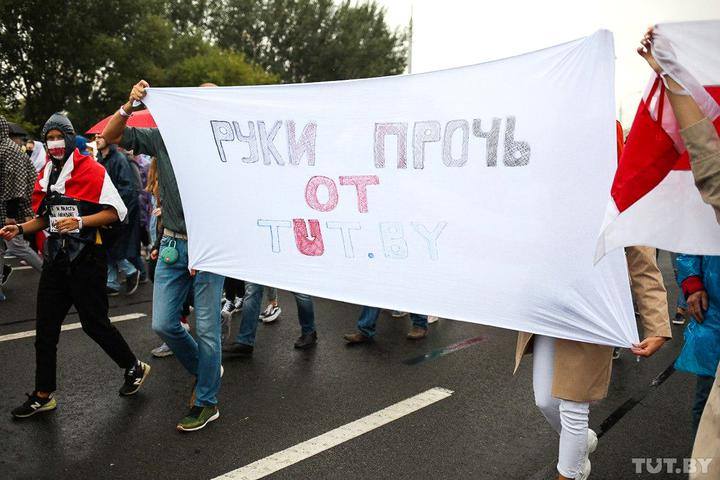
Protesters support media with «Hands Off TUT.BY» poster. Photo by TUT.BY
This is a quotation from the decision by the Interdepartmental Commission on Security in the Information Sphere under the Security Council: the decision to restrict access due to “inflicting damage on national interests» was only taken on August 21, while the resource had been offline since August 9.
The Ministry of Information in its letter attributes such measures to the fact that the blocked publications “describe the situation in Belarus following the end of the electoral campaign in a negative way and discredit the work of state bodies.»
Foreign photographers and correspondents were deported from Belarus, sometimes after beating, some were kept at the detention facility in Akrestsina. Over 100 journalists from the international media were denied accreditation prior to the election. The majority of the international media still cannot receive accreditation to be freely present in Belarus to cover the events. International organisations issued a statement condemning this practice.
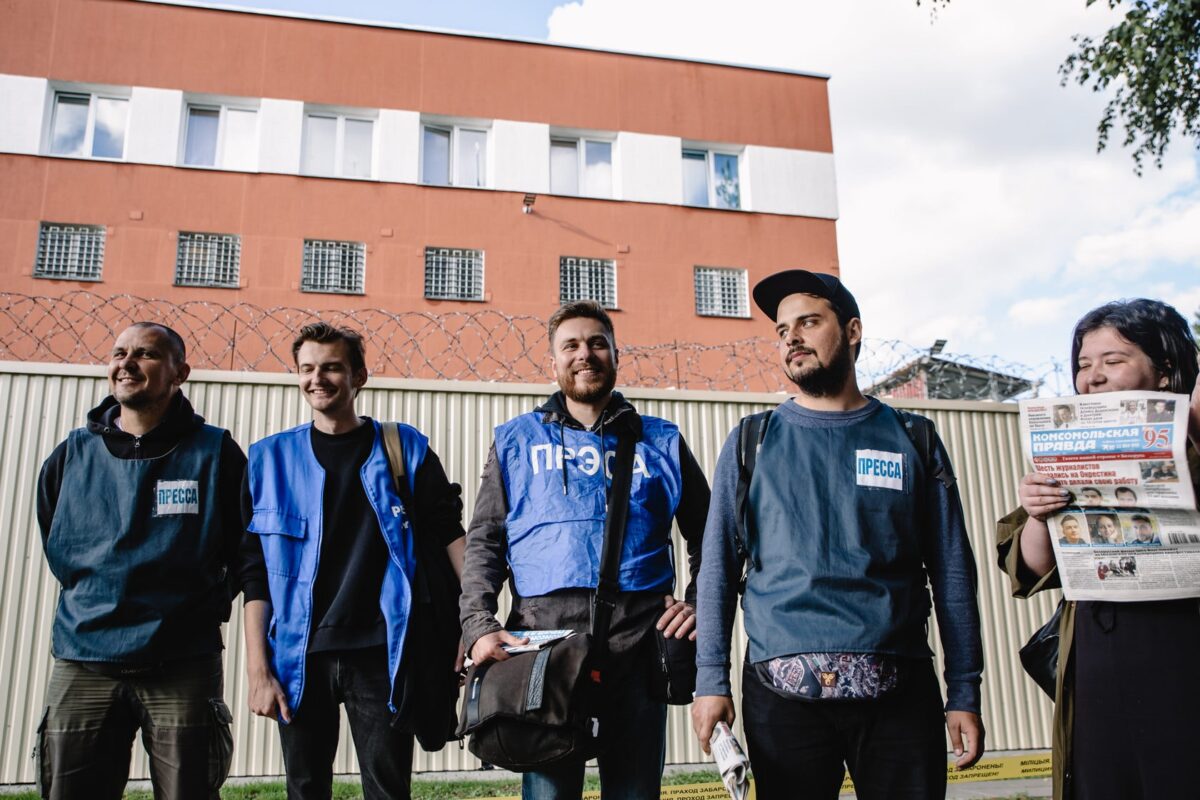
Journalists released after trials where witnesses wore balaclavas. The widely covered case features on a newspaper’s front page. Photo by Violeta Savchits
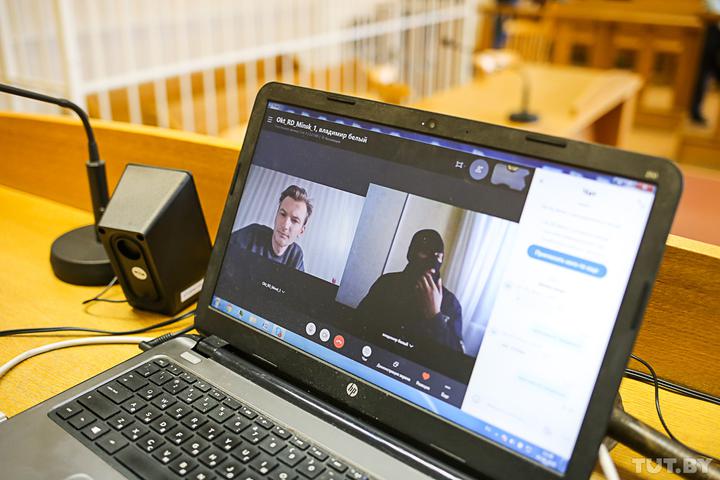
ASkype trial of a journalist who reported from a rally. A witness testifies using an assumed name and wearing a balaclava. Photo by TUT.BY
Newspapers represent a traditional source of information for older people. And those covering what is happening in the country in an unbiased manner are being denied access to printing presses and distribution among their readers.
After the 2020 election, four republican newspapers — Narodnaya Volya, Komsomolskaya Pravda in Belarus, Free News Plus, BelGazeta — were denied print and distribution. As a justification of multiple refusal to perform its obligations the state-owned House of Print stated «printing machine failure». At the same time, the state-owned newspapers were printed in the days of alleged failure.
On 1 January 2021, a local state-owned printing house refused to print Brestskaya Gazeta. Negotiations with other state-owned printing houses failed. And on 1 February, the weekly Novy Chas disappeared from the state-owned monopolist Belsoyuzpechat. On 7 Juny the newspaper was denied distribution, and on 12 August it was denied print. The Novy Chas is now available online only.
On 9 May (a state holiday and a non-working day — Ed.), the House of Print terminated the agreement with the regional newspaper Intex-press (Baranavičy) unilaterally by e-mail, without explaining the reasons for termination. A while earlier, at the end of April, Belpost also excluded the newspaper from its subscription catalogue for the second half of 2021. The publication is now issued in electronic form only. Its printed version has been issued for 26 years.
In June 2021, another two independent publications were forced to stop issuing: Regionalnaya Gazeta (Maladziečna) and Inform-progulka (Luniniec). Inform-progulka has been published since 1994, Regionalnaya Gazeta since 1995.
Terms and conditions
Partial or full reprint is permitted subject to following terms of use.
An active direct hyperlink to the original publication is required. The link must be placed in the header of the reprinted material, in the lead or the first paragraph.
Reprints, whether in full or in part, must not make changes to the text, titles, or copyrighted photographs.
When reprinting materials from this page, attribution must be given to the Press Club Belarus “Press under Pressure” project, collecting evidence of repression against independent media and journalists in Belarus.